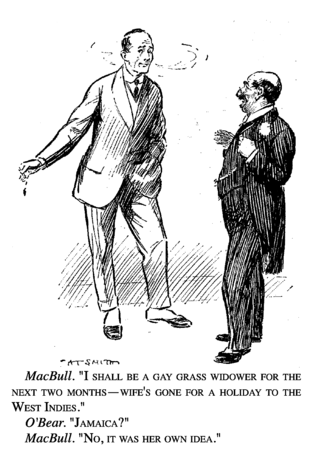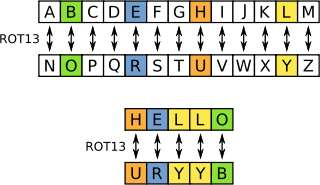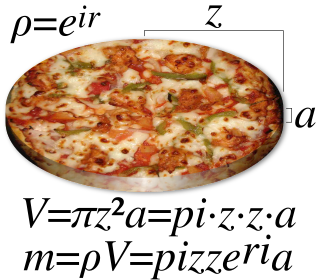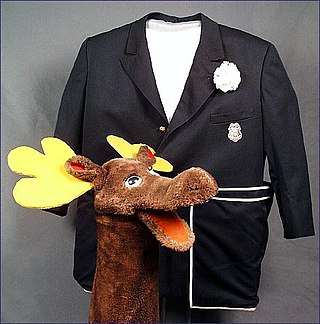
A joke is a display of humour in which words are used within a specific and well-defined narrative structure to make people laugh and is usually not meant to be interpreted literally. It usually takes the form of a story, often with dialogue, and ends in a punch line, whereby the humorous element of the story is revealed; this can be done using a pun or other type of word play, irony or sarcasm, logical incompatibility, hyperbole, or other means. Linguist Robert Hetzron offers the definition:
A joke is a short humorous piece of oral literature in which the funniness culminates in the final sentence, called the punchline… In fact, the main condition is that the tension should reach its highest level at the very end. No continuation relieving the tension should be added. As for its being "oral," it is true that jokes may appear printed, but when further transferred, there is no obligation to reproduce the text verbatim, as in the case of poetry.

The knock-knock joke is an audience-participation joke ending with a pun; a knock-knock joke is primarily a child's joke, though there are exceptions.

A pun, also known as a paronomasia in the context of linguistics, is a form of word play that exploits multiple meanings of a term, or of similar-sounding words, for an intended humorous or rhetorical effect. These ambiguities can arise from the intentional use of homophonic, homographic, metonymic, or figurative language. A pun differs from a malapropism in that a malapropism is an incorrect variation on a correct expression, while a pun involves expressions with multiple interpretations. Puns may be regarded as in-jokes or idiomatic constructions, especially as their usage and meaning are usually specific to a particular language or its culture.

ROT13 is a simple letter substitution cipher that replaces a letter with the 13th letter after it in the Latin alphabet. ROT13 is a special case of the Caesar cipher which was developed in ancient Rome.

Between the Lions is an American animated/live-action/puppet educational children's television series designed to promote reading. The show is a co-production between WGBH in Boston and Sirius Thinking, Ltd., in New York City, in association with Mississippi Public Broadcasting, the distributor from seasons 1–10. The show won nine Daytime Emmy awards between 2001 and 2007. Although it is created by alumni of the fellow PBS children’s show Sesame Street, Between the Lions was not created by Sesame Workshop, nor was it produced with their involvement in any way. The show ran on PBS Kids from April 3, 2000 to November 22, 2010, taking over the schedule slot held by The Puzzle Place upon its debut. This TV show was a companion piece to Sesame Street aimed at slightly older children.
Russian jokes (Russian: анекдоты, romanized: anekdoty, lit. 'anecdotes') are short fictional stories or dialogs with a punch line, which commonly appear in Russian humor. Russian joke culture includes a series of categories with fixed settings and characters. Russian jokes treat topics found everywhere in the world, including sex, politics, spousal relations, or mothers-in-law. This article discusses Russian joke subjects that are particular to Russian or Soviet culture. A major subcategory is Russian political jokes, discussed in a separate article. Every category has numerous untranslatable jokes that rely on linguistic puns, wordplay, and the Russian language vocabulary of foul language. Below, (L) marks jokes whose humor value critically depends on intrinsic features of the Russian language.

The wolf, goat and cabbage problem is a river crossing puzzle. It dates back to at least the 9th century, and has entered the folklore of several cultures.
An elephant joke is a joke cycle, almost always an absurd riddle or conundrum and often a sequence of such, that involves an elephant. Elephant jokes were a fad in the 1960s, with many people constructing large numbers of them according to a set formula. Sometimes they involve parodies or puns.

A mathematical joke is a form of humor which relies on aspects of mathematics or a stereotype of mathematicians. The humor may come from a pun, or from a double meaning of a mathematical term, or from a lay person's misunderstanding of a mathematical concept. Mathematician and author John Allen Paulos in his book Mathematics and Humor described several ways that mathematics, generally considered a dry, formal activity, overlaps with humor, a loose, irreverent activity: both are forms of "intellectual play"; both have "logic, pattern, rules, structure"; and both are "economical and explicit".

Mr. Moose was a puppet character on the children's television show Captain Kangaroo. Mr. Moose was created and played by Cosmo Allegretti, who also created and played Bunny Rabbit (puppet), Dancing Bear, and the Captain's painter and handyman Dennis.

Freeway is an action video game written by David Crane for the Atari 2600 and published by Activision in 1981. In the game, one or two players control chickens who cross a ten-lane highway filled with traffic. The goal is to set a high score in an allotted time. Every time a chicken gets across a point is earned for that player. Depending on the difficulty mode, a chicken is forced back a lane or sent back to the bottom of the screen when hit by a vehicle.

The newspaper riddle is a riddle joke or conundrum in English that begins with the question:
Russian political jokes are a part of Russian humour and can be grouped into the major time periods: Imperial Russia, Soviet Union and post-Soviet Russia. In the Soviet period political jokes were a form of social protest, mocking and criticising leaders, the system and its ideology, myths and rites. Quite a few political themes can be found among other standard categories of Russian joke, most notably Rabinovich jokes and Radio Yerevan.
Dead baby jokes are a joke cycle reflecting dark comedy. The joke is presented in riddle form, beginning with a what question and concluded with a grotesque punch line answer.
Anti-humor or anti-comedy is a type of alternative humor that is based on the surprise factor of absence of an expected joke or of a punch line in a narration that is set up as a joke. This kind of anticlimax is similar to that of the shaggy dog story. In fact, some researchers see the "shaggy dog story" as a type of anti-joke. Anti-humor is described as a form of irony or reversal of expectations that may provoke an emotion opposite to humor, such as fear, pain, embarrassment, disgust, awkwardness, or discomfort.
Computational humor is a branch of computational linguistics and artificial intelligence which uses computers in humor research. It is a relatively new area, with the first dedicated conference organized in 1996.

A bar joke is a type of joke cycle. The basic syntax is as follows: "A <noun> walks into a bar and <humorous event happens>".
Robot Chicken DC Comics Special 2: Villains in Paradise is an episode of the television comedy series Robot Chicken and it was aired as a half-hour special during Cartoon Network's Adult Swim on April 6, 2014. It serves as the sequel to the Robot Chicken DC Comics Special that focuses more on the Legion of Doom and is followed by Robot Chicken DC Comics Special III: Magical Friendship.
A riddle joke, joke riddle, pseudo-joke or conundrum is a riddle that does not expect the asked person to know the answer, but rather constitutes a set-up to the humorous punch line of the joke.

A dad joke is a joke, typically a pun, often presented as a one-liner or a question and answer. Generally inoffensive, dad jokes are told with sincere humorous intent or to intentionally provoke a negative "groaning" reaction to their overly simplistic humor. Dad jokes are called dad jokes because they are stereotypically thought to be jokes a father or someone like a father would tell to a child.













